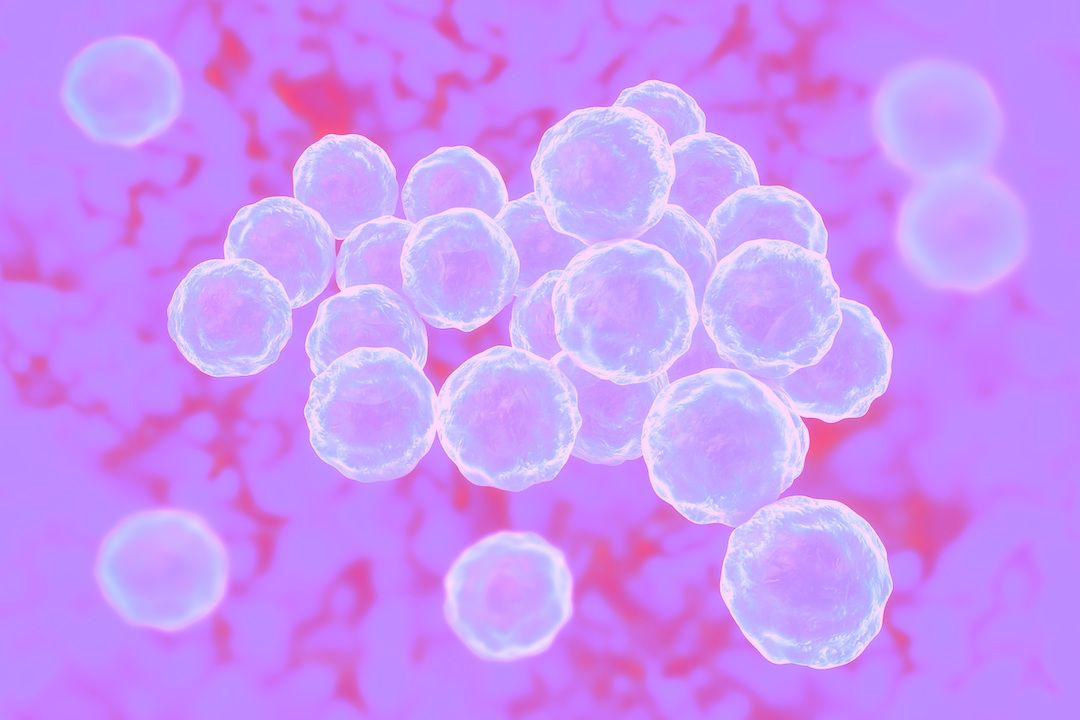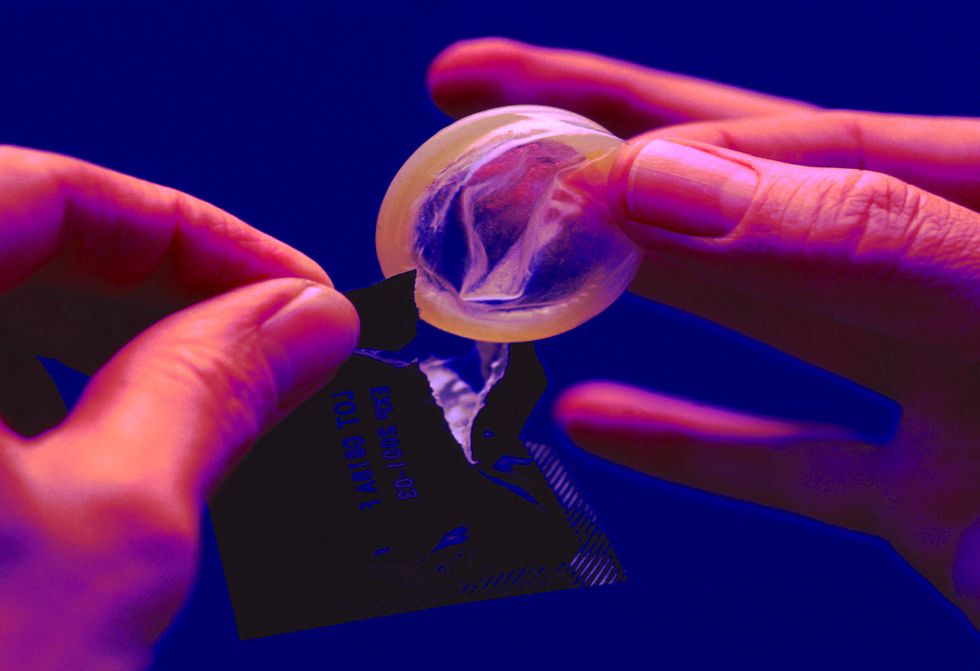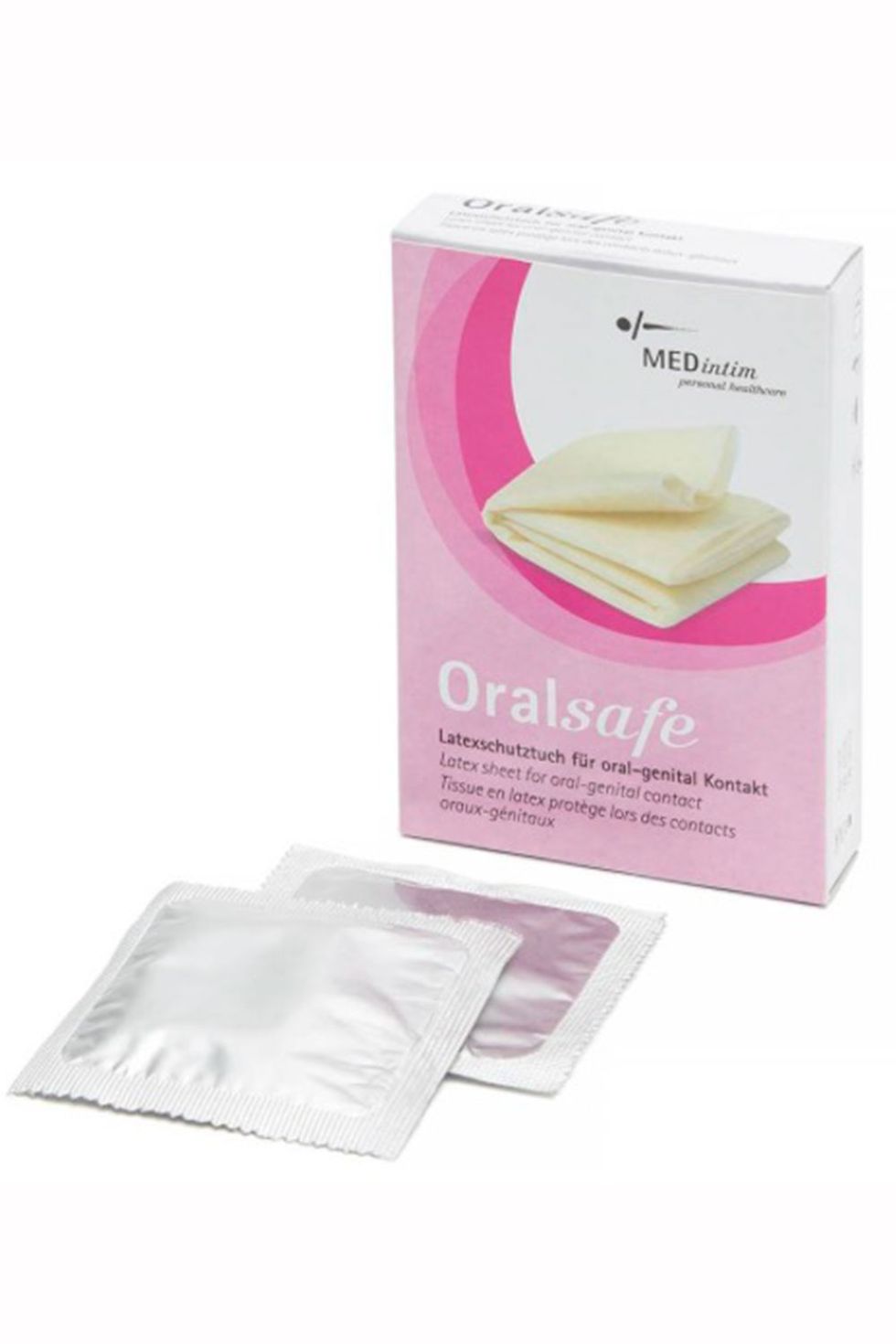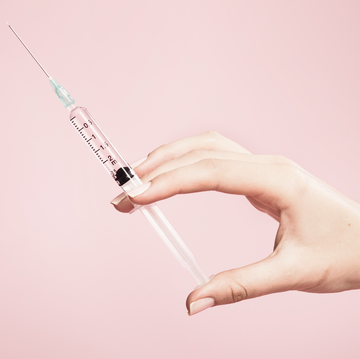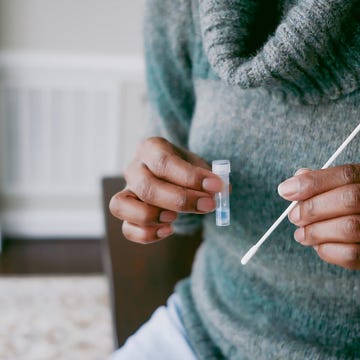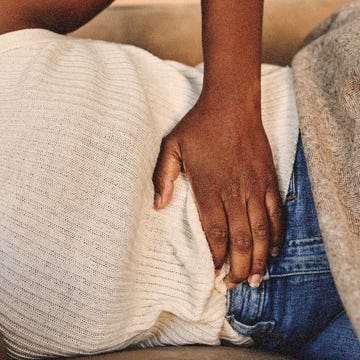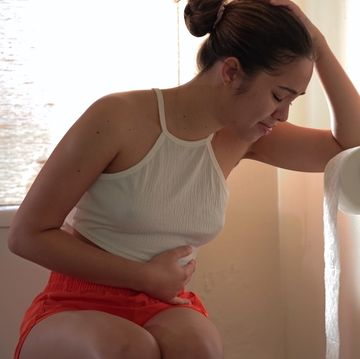Chlamydia is one of the more common bacterial infections among people of all genders, but it can be a tricky one to spot due to its fairly invisible symptoms. It's also a fairly misunderstood STI - despite being one of the most common, which means there's a lot of stigma about it. If you're unsure how to spot chlamydia, how it's spread and how to treat it, then read on...
Most people who get chlamydia will not display any symptoms at all which means that often, you can have the infection without knowing it. Often symptoms can take a few weeks to appear and when they do, you might notice -
- unusual discharge from the penis or vagina
- pain when peeing
- pelvic pain
- pain during or after sex
- irregular periods or bleeding between periods
We asked sexual health experts Helen Burkitt, Senior Sexual Health and Contraception Nurse at SH:24 and Fettle and Doctor Clare Morrison of MedExpress to explain everything you need to know about chlamydia and its symptoms.
"Chlamydia is the most common STI in the UK." says Helen Burkitt. "It can affect anyone who is sexually active, especially if they have unprotected condom-less sex and it can still be transmitted even if condoms are used due to incorrect use or breakage.
According to official statistics STIs continue to show geographic and socioeconomic variation and disproportionately impact GBMSM (gay, bisexual, and other men who have sex with men), people of Black Caribbean ethnicity, and young people aged 15 to 24 years.”
Chlamydia Symptoms
Some may find they have mild symptoms. “In women and people with vaginas, symptoms include vaginal discharge, pelvic or abdominal pain, painful intercourse, pain when passing urine, and bleeding between periods. In men and penis-havers, symptoms include discharge from the penis and painful testicles," says Dr Clare. "At least half of people with chlamydia get no symptoms at all. In this situation, there's a danger that the person may not seek treatment and may unwittingly carry it for years.”
Helen Burkitt explains that: some may only seek medical attention when they get symptoms further down the line, when the infection has been left untreated and turned into a more complex infection that requires more extensive treatment (which is why it's really important to test). They might go to their GP or local sexual health clinic because they have really bad lower abdominal pain, pain or bleeding during sex for example.
What are the long-term effects of chlamydia?
“Considering how common it is, chlamydia doesn’t often cause serious illness directly, though it can occasionally require hospitalisation in severe cases," Dr Clare explains. "It is a threat to fertility, particularly if there are recurrent infections, and particularly in women and people with wombs.
The damage it causes to the reproductive system can also increase the risk of ectopic pregnancy, a life-threatening condition where the embryo gets stuck in the fallopian tube instead of implanting in the uterus. It's not inevitable that chlamydia will cause infertility, but there is undoubtedly a risk. And, it may not be apparent until several years later when someone tries to get pregnant.”
"If someone with a vagina does not receive treatment, the chlamydia infection can spread further into the reproductive system and cause something called PID (pelvic inflammatory disease)." says Helen. "PID can cause long term damage and can lead to chronic pain, and infertility. And likewise, untreated chlamydia in someone with a penis can cause something called epididymitis which is when the tube at the back of the testicles becomes swollen and painful, or epididymo-orchitis which is when the testicles are also infected.
Symptoms can be discharge, testicular pain, swollen testicles and a build up of fluid in the testicular sack that can feel like a lump or swelling. Untreated epididymitis can also lead to infertility. Untreated chlamydia can also cause “sexually acquired reactive arthritis”- this can occur in men and women, following a chlamydia infection with or without symptoms. It causes redness and swelling in joints."
How do you catch chlamydia?
"Chlamydia's caused by a bacteria that can be spread in bodily fluids through direct genital contact. Dr Clare explains, "You can contract chlamydia through unprotected vaginal or anal sex, intimate genital contact and sharing sex toys. You've probably heard loads of rumours about chlamydia, and they're probably bullshit.
Some people worry that they could catch chlamydia from sharing towels or toilet seats, but this isn’t the case. Some think that you can’t catch chlamydia unless you have multiple partners, but it is possible to catch chlamydia from just one partner, if they have had sex with someone else previously.”
"You cannot transmit chlamydia by kissing, hugging, sharing towels, from a toilet seat for example." agrees Helen. "It can be transmitted by touching if your hands have been in contact with genital secretions/sexual fluids. This is how it can be transmitted to the eyes, and also your genital and anal area even if you don’t have penetrative vaginal/anal sex. It can also be transmitted via sex toys (which is why it's really important to wash them after every use)."
Chlamydia generally affects the cervix and the penis. However, it can also affect the throat, rectum and eyes. Often there are no symptoms with rectal chlamydia, but if there are these will be rectal pain, discharge, and/or bleeding.
Oral chlamydia (in the throat- where the tonsils are) is spread by oral sex when someone gives a person with a penis oral sex (to clarify the penis will touch the back of the throat). There is very low-to-no risk of transmitting chlamydia if a person is giving someone with a vagina oral sex. Oral chlamydia usually has no symptoms.
Chlamydia can also infect the eyes (via contact with genital secretions) this will cause conjunctivitis type symptoms. If a baby is born while the mother has untreated chlamydia, they may suffer from eye or chest infections.
SHOP NOW Pleasure Me Condoms, Durex, £14.99
How to you test for chlamydia?
For people with vaginas, it's a vaginal swab. For people with penises, it's a urine test. Advises Helen Burkitt. To test for oral and rectal gonorrhoea its swabs for both sites. These tests will need to be sent to a lab for testing.
For the urine tests, it means urinating into a sample bottle (you will need to hold your pee for at least 1.5 hrs, it will need to be the first stream of urine that comes out). For the swab tests, they’re all self-sample, whether you’re doing it at home or at a clinic. If you go to a clinic with symptoms that need examining , a clinician will want to have a look and will likely do the swabs at the same time. If you go to a clinic just for a simple test, you will be able to do it yourself in private, which means it's a probably more comfortable experience.
It's important to remember that tests need to be done at certain times in order to be accurate. The test for chlamydia (and gonorrhoea) will not be accurate until 14 days (two weeks) after sexual contact. There is no point testing before then as the results may not be accurate. If you develop symptoms before that time, speak to your GP or local sexual health clinic. You can do a test for chlamydia with an online testing service like SH:24, at your local sexual health clinic or your GP.
Chlamydia treatments
“Chlamydia is easily treatable, with prescribed antibiotics, usually azithromycin or doxycycline. If you discover that you are infected, do make sure that your partner is treated as well. The only way to be sure to prevent chlamydia? Use a condom or dental dam before any intimate contact. If you are at risk, get checked regularly, particularly if you have a new sex partner.” says Dr Clare.
"There are other antibiotics you can take as not everyone can take doxycycline (including if you’re pregnant, or at risk of pregnancy)." explains Helen. "Whatever you are prescribed, it is really important that the full course of antibiotics is taken correctly. It takes seven days for the infection to clear so there must be no sexual contact at all (including with condoms) for seven days whilst you wait for the infection to clear.
SHOP NOW Oralsafe Strawberry Flavoured Dental Dams, Lovehoney, £14.99
You can get treatment from your local sexual health clinic, your GP, your online testing service who diagnosed you, or you can buy it online from online pharmacies.
A ‘test of cure’ can be done to check if the infection has cleared (this is not compulsory but is sometimes recommended by clinics, particularly if someone has missed one or two tablets, or taken second line treatment). This has to be done at least six weeks after starting treatment, as if taken too early, there is the risk of getting a false positive."
How often should you get tested?
There's no shame in getting an STI, if you’re sexually active it's likely going to happen to a lot of people. The best way to avoid getting chlamydia is to have protected sex (use condoms), stay up to date with your STI testing, and talk to your partners about testing too. If you are having sex with one partner only, ensure you both test accurately before you start having condom-less sex.
If you’re changing partners regularly then national guidelines currently advise testing every 12 weeks. If you don’t change partners often, but you are sexually active, it's advisable to test once a year, just to ensure you are free of infection.
"Never rely on anyone else’s test results!" says Helen. "If your partner gets a negative test result, this doesn’t mean you will too. It’s really common for people to get different results for a number of reasons so it's really important to do your own test, even if you consider yourself to be low risk. You never know someone else’s sexual history apart from your own. Never let anyone make you feel bad for doing an STI test. It means you are being proactive about looking after your health, and other people’s."
